21 May2019
By Brandon R.T. Frost
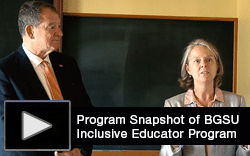 AACTE is excited to share the latest videos of its Research-to-Practice Spotlight Series on Special Education this spring. The video interviews feature faculty, students, and school district leaders who work with Portland State University (Portland, OR) and Bowling Green State University (Bowling Green, OH) to implement extensive clinical preparation for teacher candidates pursuing careers in general and special education. The link to view the video series is now available!
AACTE is excited to share the latest videos of its Research-to-Practice Spotlight Series on Special Education this spring. The video interviews feature faculty, students, and school district leaders who work with Portland State University (Portland, OR) and Bowling Green State University (Bowling Green, OH) to implement extensive clinical preparation for teacher candidates pursuing careers in general and special education. The link to view the video series is now available!
In my recent blog post, I shared a brief introduction to the new Research-to-Practice Spotlight Series. The videos highlight exemplary practices of the two teacher preparation programs for ensuring their candidates are ready to work with all students, including students with disabilities. Though different in many programmatic elements to address their local contexts, each university designed their programs to equip all teachers with the skills necessary to instruct the diverse needs of their student population.
The Master’s Program in Secondary Dual Education at Portland State University features dual certification in both general and special education at the secondary level. Entrants to the program come with an undergraduate degree in a content area and engage in two years of extensive and increasing involvement in clinical settings in secondary schools. Principals consider the program transformative in terms of the skills graduates bring to their classrooms.
20 May2019
By Jane E. West
This blog post is written by AACTE consultant Jane West and is intended to provide update information. The views expressed in this post do not necessarily reflect the views of AACTE.
Today marks the 65th Anniversary of the Brown vs. Board of Education Supreme Court landmark decision that established the principle that separate is not equal. How far have we come? Much to contemplate here. You will see below that a House education panel spoke loud and clear on that topic: we have a long way to go.
- Trump Proposes Taking More Funds from Pell Grants – to Fund Moonshot? Huh?
This week President Trump submitted to Congress some revisions to his original budget request. Notably, he took back the proposed cut he originally made for Special Olympics (after great bipartisan outrage); but he also added a new cut in the form of an additional $1.9 billion to the Pell grant surplus. It appears that the Pell cut would go toward funding the President’s proposed 2024 NASA moonshot! Education advocates were outraged. As Jon Fansmith of the American Council on Education put it: “Do I want to make college more expensive to fund space travel to the moon and Mars?” Hmmmm …
The President had already requested a $2 billion cut in Pell funding. So the total $3.9 billion recission would result in the Pell surplus being exhausted by 2022! This request is likely to be ignored on Capitol Hill, as no one—Republican or Democrat—ever really contemplated cutting Special Olympics. And while the Pell Surplus has been modestly raided in the past, a $3.9 billion cut is highly unlikely.
15 May2019
By JTE Insider

Read the latest JTE Insider blog interview by the Journal of Teacher Education (JTE) editorial team. This blog is available to the public, and AACTE members have free access to the articles in the JTE online archives—just log in with your AACTE profile.
This interview features insights from the article “Measuring Teaching Quality of Secondary Mathematics and Science Residents: A Classroom Observation Framework” by Imelda Nava, Jaime Park, Danny Dockterman, Jarod Kawasaki, Jon Schweig, Karen Hunter Quartz, and José Felipe Martínez. The article was published in the March/April 2019 issue of the Journal of Teacher Education.
08 May2019
By Erica D. McCray

The CEEDAR Center will present Culturally responsive education: A course enhancement module (CEM) designed to ensure every educator meets the needs of each learner on Tuesday, May 21, 1:00 p.m. (ET). Registration is now open.
The CEEDAR Center, an OSEP-funded technical assistance center is proud to collaborate with national organizations, technical assistance centers, and stakeholders across the country to ensure that every student with a disability has an equitable opportunity to achieve. Teacher and leader development through policy, preparation, and program improvement is central to our mission. Our partnership with AACTE provides an opportunity to support AACTE’s strategic focus on Diversity, Equity, and Inclusion.
06 May2019
By JTE Insider

Read the latest JTE Insider blog interview by the Journal of Teacher Education (JTE) editorial team. This blog is available to the public, and AACTE members have free access to the articles in the JTE online archives—just log in with your AACTE profile.
This interview features insights from Melanie M. Acosta, author of the JTE article “The Paradox of Pedagogical Excellence Among Exemplary Black Women Educators.” The article is published in the Jan/Feb 2019 issue of the Journal of Teacher Education.
Q1. What motivated you to pursue this particular research topic?
I was compelled to study the professional experiences of exceptional Black women educators for many reasons. One of the most important reasons was related to my own positionality as a Black woman educator with a record of success in teaching. Another crucial reason I wanted to pursue research on Black women educator professional experiences was related to expanding and complicating the dialogue on diversifying the teaching force to focus on issues affecting Black teacher retention, which includes teachers’ positionalities and the treatment of Black women educators in schools.
19 Apr2019
By Linda Minor
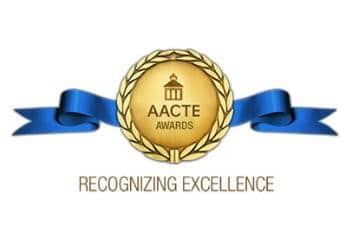
Applications for the 2020 AACTE awards are now open on AACTE’s online submission site. Entries for the Outstanding Book Award are due May 16 and entries for the Outstanding Dissertation Award are due August 20. All other award submissions are due October 9.
This is the 24th year AACTE’s awards program has been recognizing member institutions’ exemplary programs as well as individuals who have made noteworthy contributions to education preparation. For an overview of the 2019 award winners, see this press release.
12 Apr2019
By Denise Pearson

Historically black colleges and universities (HBCUs) and other minority-serving institutions (MSIs) are uniquely positioned to engage higher education policymakers, researchers, practitioners, and other stakeholders to increase the participation of males of color throughout the teacher pipeline. To that end, Project Pipeline Repair: Restoring Minority Male Participation and Persistence in Educator Preparation Programs is a three-year, research-based initiative that emphasizes cross-sector collaboration as foundational to addressing three interconnected problems: nationwide teacher shortages, the lack of teacher diversity, and the teaching profession narrative.
On October 2-5, 2019, the State Higher Education Executive Officers Association (SHEEO) will host the Project Pipeline Repair Summit that will bring together P-16 policy, institutional, and community leaders to culminate this collaboration between state agencies, HBCUs, and partnering school districts in four states (Arkansas, Louisiana, Mississippi, and South Carolina). During the Summit, we will engage in deep conversations with higher education policy and practice experts, including educator preparation researchers and practitioners. Representatives from other MSIs and organizations with similar aims are welcomed, and will also be present to expand the learning and build capacity in these important policy and practice areas.
02 Apr2019
By Katrina Norfleet
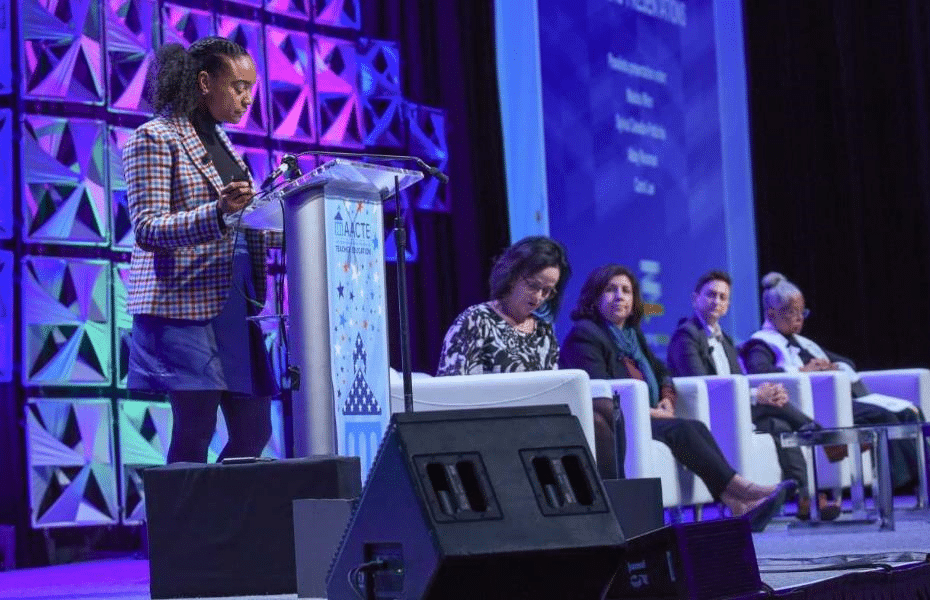
During the “Disrupting the Persistence of Oppression” Deeper Dive session, panelists explored the question: How does knowing content matter for disrupting the persistence of oppression? The panel discussion was moderated by Deborah Ball, director of TeachingWorks at the University of Michigan and included Maisha Winn, Chancellor’s Leadership Professor in the School of Education and co-director of the Transformative Justice in Education (TJE) Center at the University of California, Davis; Sylvia Celedon-Pattichis, senior associate dean for research and community engagement and professor of bilingual and mathematics education at the University of New Mexico; Abby Reisman, assistant professor of teacher education at the University of Pennsylvania; and Carol Lee, former Edwina S. Tarry Professor of Education, School of Education, of Social Policy and African-American Studies at Northwestern University.
Winn began the panel discussion with a scholarly presentation focused on restorative justice and shared a narrative framework she developed for teachers to consider when seeking justice in the school setting. The framework is based on four pedagogical stances: history matters, race matters, justice matters, and language matters. She presented the framework and shared her desire to add a fifth stance: futures matter.
02 Apr2019
By Ward Cummings
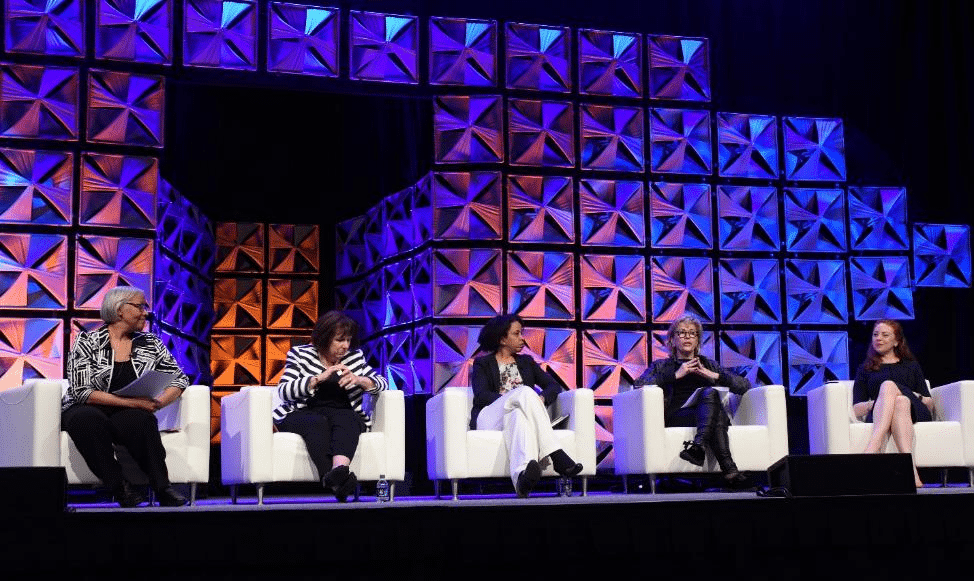
The “AACTE Initiatives toward Increasing Diversity, Equity and Inclusion in Colleges of Teacher Education” Deeper Dive session was held during the 2019 Annual Meeting. The session highlighted the association’s current, ongoing, and future commitments in these areas in a discussion moderated by Jennifer Robinson of Montclair State University and included panelists Lillian Sharon Leathers of William Paterson University of New Jersey and AACTE’s Jacqueline King, Jacqueline Rodriguez, and Jane West.
King, author of AACTE’s recently published Education Students and Diversity: A Review of New Evidence report, described the findings, which showed that education is the least diverse in bachelor’s degree fields. King shared other important data such as 50% of African American education students and 40% of Hispanic education students are independent; 30% of African American students and 20% Hispanic students had children; and 20% African American students were single parents. She emphasized that child care, for example, is an issue that cannot be ignored when considering the matter of diversity. In addition, 4% of Hispanic students are first generation students and 22% do not have a parent that has graduated from high school. The study revealed that one in five African American students work full-time and that the median family income of white, dependent students is more than double of their African American and Hispanic peers.
02 Apr2019
By Jerrica Thurman
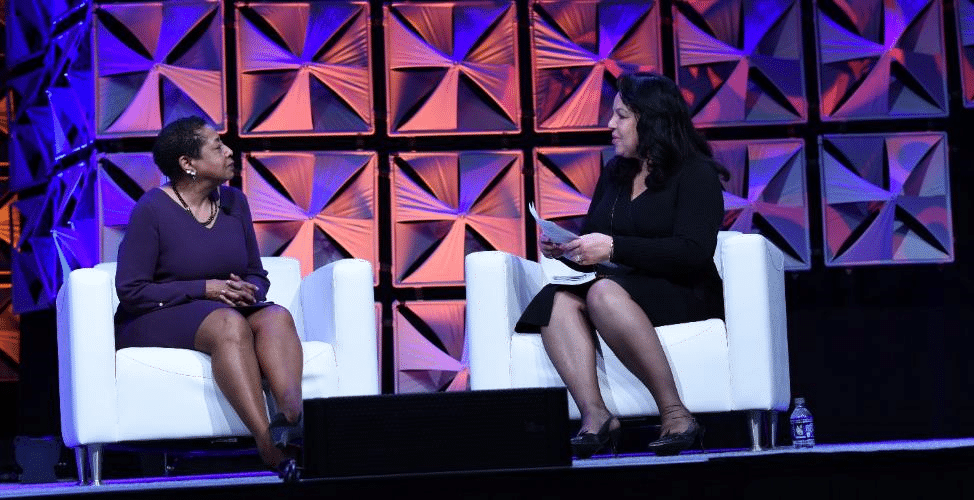
Annual Meeting Closing keynote speakers Mary Dilworth, editor of Millennial Teachers of Color, and Leslie Fenwick, dean emerita of Howard University, presented the topic, “Millennial Teachers of Color: Follow Their Lead, They Know Where We Need To Be,” on Sunday, February 24. During the session, the educators explored millennial teachers through a new lens by examining the intersection of race ethnicity and generation.
Dilworth has centered her career on teacher quality and preparation, with a keen focus on racial/ethnic and linguistic diversity and equity issues. Recently, she was a co-principal investigator for the National Science Foundation (NSF-DR12) project designed to recruit, prepare, license, and employ middle and high school science teachers from underrepresented groups. In addition, she served as a visiting professor and director of the Center for Urban Education at the University of the District of Columbia. Earlier in her career, she was a research fellow with Howard University’s Institute for the Study of Educational Policy (ISEP) and became widely recognized for heightening the national discourse on the disparate impact of licensing tests on underrepresented groups.
01 Apr2019
By Deondra Gladney and Stephanie Jones-Fosu
The AACTE Holmes Scholars Program recently welcomed two new members: University of North Carolina at Charlotte (UNCC) doctoral students Stephanie Jones-Fosu and Deondra Gladney. The two Scholars share their experience as first-time AACTE Annual Meeting and Holmes Preconference attendees.
Stephanie’s Reflection
The Holmes Scholar Program is designed to provide equitable opportunities to emerging scholars from underserved populations. By having the distinct opportunity to be one of first Holmes Scholars from UNCC, an entire level of educational greatness has been literally dropped in my lap. During the 2019 AACTE Annual Meeting in Louisville KY, the Holmes Program created an exclusive preconference event where Holmes students at various levels of education came together to learn and grow from Scholars around the country.
29 Mar2019
By Chandra Floyd
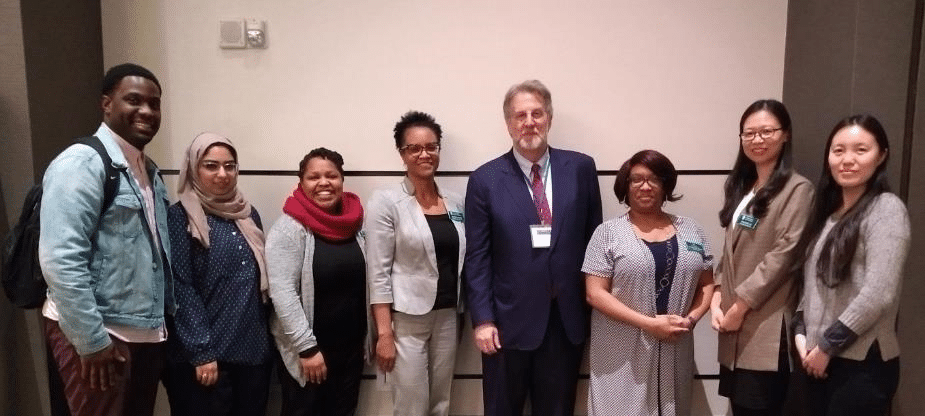
Spencer Niles, dean of the School of Education, College of William & Mary poses with Holmes Scholars (L-R) Okenna Egwu, Leila Warraich, Jessica Scott, Denise Lewis, Chandra Floyd, Jingjing Liu, Shuhui Fan
Twelve College of William & Mary (W&M) Holmes Scholars attended the Holmes Scholars Annual Meeting in Louisville, KY in February as part of the 71st American Association of Colleges for Teacher Education (AACTE) Annual Meeting. The AACTE Holmes Program encourages diversity in education by providing mentorship opportunities to students from high school through doctoral programs who are interested in careers in education. William & Mary’s 14 current Holmes Scholars are high-achieving doctoral students from populations underrepresented in higher education.
26 Mar2019
By Katrina Norfleet
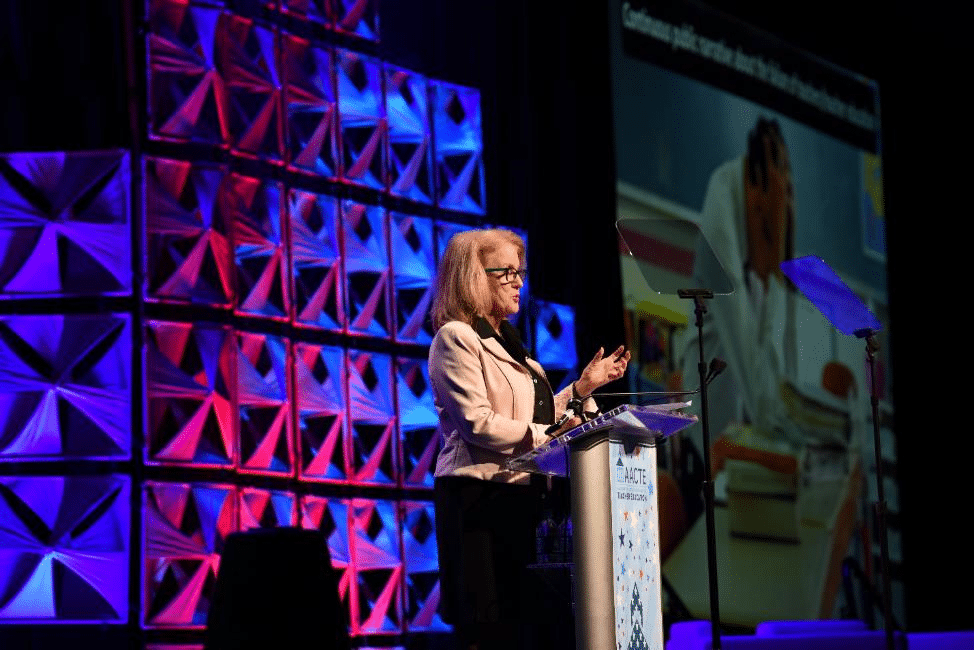
Opening keynote speakers Marilyn Cochran-Smith of Boston College and Marvin Lynn of Portland State University, explored the challenges with accountability in teacher education in a provocative discussion on Friday, February 22.
Cochran-Smith is the Cawthorne Professor of Teacher Education for Urban Schools in the Lynch School of Education at Boston College. A teacher educator for more than 40 years, she stressed that teacher educators are passionate about accountability for the learning and development of the teacher candidates they work with, as well as the students, families, and communities the future teachers will serve.
“I have never met a teacher educator who didn’t feel accountable and who didn’t want to be accountable for his/her work,” said Cochran-Smith. “The trouble with teacher education accountability is not with accountability itself; it’s what teacher education has been held accountable for.”
21 Mar2019
By Ward Cummings
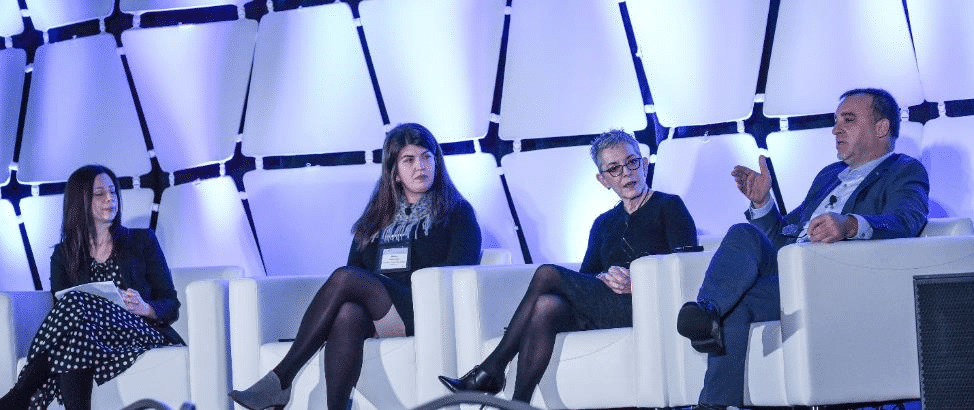
Teacher shortages vary across the country by subject area, but the shortage is worst in high-minority, low-income schools, in lower wage states, and in districts with poorer working conditions. This topic was explored during a “Deeper Dive” session at the AACTE 2019 Annual Meeting titled “Successful Strategies for the Teacher Shortage.”
Jessica Cardichon of the Learning Policy Institute led the panel discussion, which included Patricia Alvarez McHatton (University of Texas), Selma Powell, (University of Washington), and Mario Santos (Newark Public Schools). Each participant shared their strategies for addressing the teacher shortage in three critical areas: recruitment, completion, and retention.
07 Mar2019
By Barbara Baals
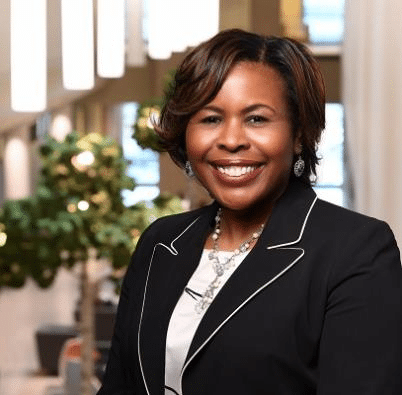 This article on AACTE Board of Director Monika Williams Shealey and accompanying photo originally appeared in Rowan Today and are reprinted with permission.
This article on AACTE Board of Director Monika Williams Shealey and accompanying photo originally appeared in Rowan Today and are reprinted with permission.
Monika Williams Shealey has been named senior vice president of the newly created Division of Diversity, Equity and Inclusion at Rowan University.
Shealey, who joined Rowan as dean of the College of Education in 2013, will oversee a division that brings together departments and programs to develop initiatives designed to address issues of access, equity and inclusion across all of the University’s campuses.
“Under Dr. Shealey, the Division of Diversity, Equity and Inclusion will be tasked with making Rowan a model institution—a University where diversity is valued and equity and inclusion are routine,” Rowan President Ali A. Houshmand said in announcing Shealey’s appointment.
 AACTE is excited to share the latest videos of its Research-to-Practice Spotlight Series on Special Education this spring. The video interviews feature faculty, students, and school district leaders who work with Portland State University (Portland, OR) and Bowling Green State University (Bowling Green, OH) to implement extensive clinical preparation for teacher candidates pursuing careers in general and special education. The link to view the video series is now available!
AACTE is excited to share the latest videos of its Research-to-Practice Spotlight Series on Special Education this spring. The video interviews feature faculty, students, and school district leaders who work with Portland State University (Portland, OR) and Bowling Green State University (Bowling Green, OH) to implement extensive clinical preparation for teacher candidates pursuing careers in general and special education. The link to view the video series is now available!
















 This article on AACTE Board of Director Monika Williams Shealey and accompanying photo originally appeared in
This article on AACTE Board of Director Monika Williams Shealey and accompanying photo originally appeared in